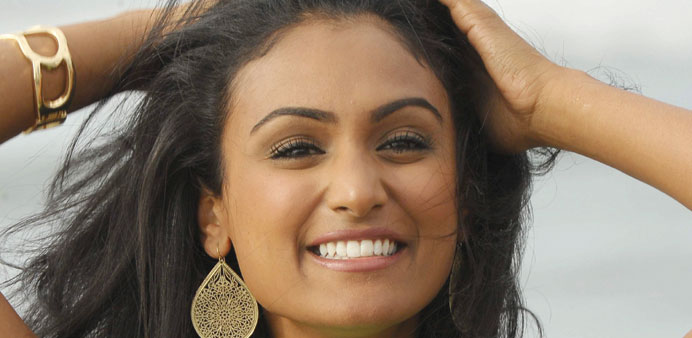|
Shortly before she was crowned the first Miss America of Indian descent, Nina Davuluri was asked about a Chinese American celebrity who admitted undergoing surgery to reshape her eyes. |
In the interview before a national audience on Sunday, 24-year-old Davuluri tactfully avoided criticising television personality Julie Chen but made clear that she would do nothing similar.
“I’ve always viewed Miss America as the girl next door. And the girl next door is evolving as the diversity in America evolves,” said Davuluri, who was born in Syracuse, New York, to parents from the southern Indian state of Andhra Pradesh.
“I wouldn’t want to change someone’s looks or appearance, but definitely be confident in who you are,” she said.
Davuluri fully embraced her heritage at the competition, donning a ruby-hued choli that bared her midriff as she performed a Bollywood-infused Indian dance.
But her victory triggered a spate racist postings on social media, with some Twitter users questioning if she was American and even falsely associating her with Islamic extremism.
“The first Indian American winner is significant in that it further widens our conception of female beauty and what it means to be an American,” said Blain Roberts, a historian at California State University at Fresno.
While critics see Miss America as an antiquated contest that objectifies women, Roberts said that the pageant nonetheless viewed itself as an “embodiment of America”.
Roberts, the author of a forthcoming book on the racial dynamics of beauty pageants, said that the 92-year-old Miss America contest initially excluded non-whites.
White women from the former Confederacy - the reputed “Southern Belles” - dominated the contest starting in the 1950s just as the country’s attention was turning to racial discrimination, she said.
The first African American Miss America was not until 1983 when Vanessa Williams won, although she was later stripped of the tiara in a scandal over nude pictures.
US Representative Grace Meng of New York likened Davuluri’s victory to that of Bess Myerson, who was crowned the first Jewish Miss America in 1945 soon after the end of World War II.
One controversial issue is whether minorities in the US, consciously or unconsciously, conform to white conceptions of beauty.
As in other diverse nations such as Brazil and India, women with paler complexions have traditionally dominated advertisements and cinema.
Chen, the host of reality show Big Brother, said she underwent eye surgery early in her career after pressure from a boss. Large numbers of African Americans historically have straightened their hair.
But by some measures, change has come rapidly in the US, which elected Barack Obama as its first African American president in 2008 and has two Indian American state governors.
Non-Hispanic whites are expected to become a minority by the 2040s.
A recent survey by research firm Mintel found that nearly three-quarters of African American women let their hair go natural, with sales of hair relaxers dropping by 26% since 2008.
A 2010 poll by the Pew Research Center found that virtually all Americans under age 30 accept interracial marriage, as opposed to only 36% of whites over 65.
“Each succeeding generation gets more and more used to living in a diverse, multicultural society,” said C N Le, a sociologist at the University of Massachusetts at Amherst.
Le said that Davuluri represented a “melding” of white conceptions of beauty and those of her own heritage.
“She does sort of conform to white standards of beauty. She has a very symmetrical face, a very chiselled cheek line,” Le said.
“But having said that, she clearly represents her Indian heritage in a very positive way. She emphasises her dark eyes, her skin tone is obviously darker, and she hasn’t, I presume, tried to lighten her skin,” he said.

